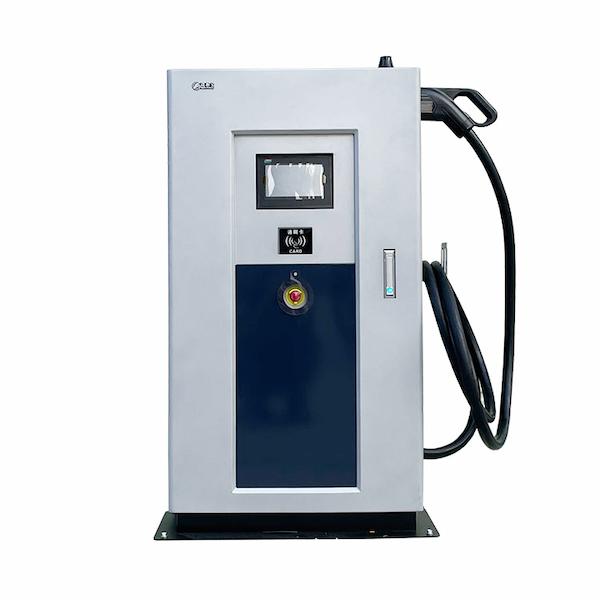According to charging methods, charging piles can be divided into AC charging piles, DC charging piles, and AC-DC integrated charging piles. Among them, AC charging has low power and requires a long charging time, but the battery loss is small. On the contrary, DC charging piles have high charging power and high charging speed, but the battery loss is also large.
The charging pile is fixed on the ground, using special charging interface and conduction mode to provide AC power for electric vehicles with on-board charger, and has corresponding communication, billing and safety protection functions. Citizens only need to buy IC cards and recharge them, and they can use charging piles to charge their cars.
After the electric vehicle battery is discharged, direct current passes through the battery in the opposite direction to the discharge current, so that it can recover its working ability. This process is called battery charging. When charging the battery, the positive electrode of the battery is connected with the positive electrode of the power supply, and the negative electrode of the battery is connected with the negative electrode of the power supply. The voltage of the charging power supply must be higher than the total electromotive force of the battery.
There are two charging methods: constant current charging and constant voltage charging.
Constant-current charging method is a charging method that keeps the charging current constant by adjusting the output voltage of the charging device or changing the resistance in series with the battery. The control method is simple, but the acceptable current capacity of the battery gradually decreases with the charging process. At the later stage of charging, the charging current is mostly used to electrolyze water and generate gas, which leads to excessive outgassing. Therefore, the staged charging method is often used.
The voltage of the charging power supply keeps a constant value during the whole charging time, and the current gradually decreases with the gradual increase of the terminal voltage of the battery. Compared with the constant current charging method, the charging process is closer to the optimal charging curve. Fast charging with constant voltage, because the electromotive force of the battery is low at the initial stage of charging, and the charging current is very large, the current will gradually decrease with the progress of charging. Therefore, only a simple control system is needed.
AC electric vehicle charging pile, commonly known as "slow charging", is a power supply device which is fixedly installed outside the electric vehicle and connected with the AC power grid to provide AC power for the on-board charger of the electric vehicle (i.e. the charger fixedly installed on the electric vehicle). AC charging pile only provides power output, but has no charging function. It needs to be connected to on-board charger to charge electric vehicles. It is equivalent to just playing a role in controlling the power supply.
At present, charging piles are divided into AC charging piles and DC charging piles. The single-phase/three-phase alternating current output by the pile is converted into direct current through on-board charger to charge the vehicle battery, and the power is generally low (7kw, 22kw, 40kw, etc.) and the charging speed is generally slow, so it is generally installed in residential parking lots and other places.
DC electric vehicle charging station, commonly known as "fast charging", is a power supply device which is fixedly installed outside the electric vehicle and connected with the AC power grid, and can provide DC power for the power battery of off-board electric vehicle. The input voltage of the DC charging pile is three-phase four-wire AC 380 V 15% with a frequency of 50Hz, and the output is adjustable DC, which directly charges the power battery of the electric vehicle. As the DC charging pile is powered by three-phase four-wire system, it can provide enough power, and the output voltage and current can be adjusted in a wide range, which can meet the requirement of fast charging.
Direct current charging piles (or non-on-board charger) directly output direct current to charge the vehicle battery, with high power (60kw, 120kw, 200kw or even higher) and high charging speed, so they are generally installed in charging stations beside expressways.
Simply put, AC charging piles need to be charged by on-board charger, while DC fast charging piles don't need this equipment. There is a big difference in charging speed between the two. It takes 8 hours for a pure electric vehicle (ordinary battery capacity) to be fully discharged through the AC charging pile, while it only takes 2 to 3 hours for it to pass through the DC fast charging pile. The AC charging pile provides power input to the charger of electric vehicle, and the power of on-board charger is not large, so it can't realize fast charging. The DC charging pile is a power supply device which is fixedly installed outside the electric vehicle and connected with the AC power grid, and can provide DC power for the power battery of the off-board electric vehicle. The DC charging pile can provide enough power, and the output voltage and current can be adjusted in a large range, thus meeting the requirements of fast charging.
